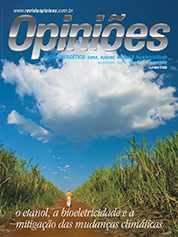Renato Lunardi de Amorim
Partner of Carnegie Hill Global Advisors
Op-AA-22
Internationalization and political risk
Creating a global market for biofuel will require expanding sugarcane production and that of other raw materials, as well as the processing and storage capacity, to beyond the borders of Brazil. Although the country has unique physical conditions to preserve its production leadership in the long-term, this movement will be necessary to stabilize international supply.
In this context, it is plausible that the internationalization of Brazilian biofuel producers will occur on a large scale in coming years. This possibility stands out in the government’s discourse vis-à-vis developing countries and begins to be a part of the strategic considerations of investor companies and groups.
International investments on the scale required to consolidate the global market for biofuel require attention to the variables still seldom present in the strategic planning processes of companies in Brazil and in other emerging countries that lack the experience of dealing transnationally, combined under the political risk label.
This is about risks that are difficult to quantify, that result from the interaction of political, social, cultural and economic factors, whose extreme materializations are contractual breaches and sudden changes in transaction costs. When the term “globalization” became popular in the last decade, a large part of the literature on the subject referred to it, from the point of view of capital flows, as expansion and production complementation movements initiated in developed countries. Hence, to a certain extent, the recent surprise that results from the ascension of “emerging multinationals”.
In practice, they are similar to their corporate akin in terms of management and objectives, albeit they tend to be more willing to take on risk. However, one fundamental difference distinguishes the countries where they are headquartered. With the exception of China, emerging countries with their own multinational corporations have a low capability to project themselves geopolitically or to intervene diplomatically in crisis situations.
In the first half of 2006, two Brazilian companies felt the practical effects of this. Petrobras was targeted by a nationalist-populist campaign in Bolivia, which resulted in the expropriation of assets. Vale, due to pressure from the Chinese government, lost a big iron ore project in Gabon. In both cases, the capability of the Brazilian government to act preventively and negotiate post-facto compensations proved limited. And we are talking about the country’s two largest companies.
The probable international production expansion of biofuel companies is expected to occur in poor countries, usually weak on governance. Investments will face high political risks, which may become more threatening due to a trend still little analyzed, and which may possibly lead to nationalistic counter-reactions to foreign investments in agribusiness, in some countries and regions.
In several countries in Africa and Southeast Asia, but less in Latin America, governments of countries with structural bottlenecks in the production of food, and with abundant resources (Saudi Arabia, China and others), through sovereign funds or other mechanisms, are acquiring land for the dedicated production of food. The evolution of these arrangements may have, as a collateral effect, the dissemination of resistance to foreign entrepreneurship, regardless of national origin.
This is an incipient phenomenon, but it merits being monitored to assess risks similar to the hostilities faced by Brazilian soya producers in Paraguay and Bolivia. The mitigation of political risk requires complementary corporate and governmental initiatives. On the part of companies, the first step is to appropriately assess the social and political context in planning and operating international projects.
Not to do so may result in super estimating the ROI potential of investments and the lack of financial or operational provisions for crisis situations. The engagement with local publics is a useful tool, particularly through well-planned social development initiatives and in building the image of the responsible company. The introduction of local private or governmental partners in the business also tends to be an effective tactic.
The second element is the effort to align business and foreign policy interests. This is an agenda in which the Brazilian role is little consistent, which has little to do with reinforcing embassies in investment receiving countries, but rather, with setting up cooperation channels with key countries, negotiating investment protection agreements and fostering institutions and bringing about the adequate treatment of foreign investment.
Foreign policy should and must treat the investor as a partner in projecting the country internationally. But this only works when companies understand the risks they are exposed to and when they employ their individual and collective weight to influence the government’s agenda. What is not acceptable is to ignore changes in risk standards that naturally result from the increased international role of Brazilian companies.




